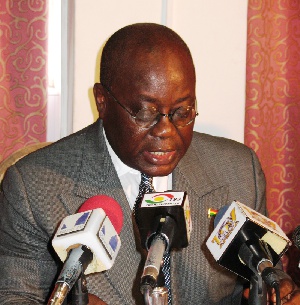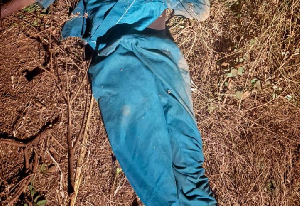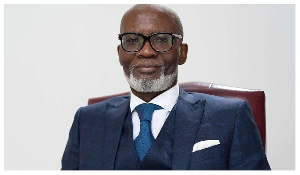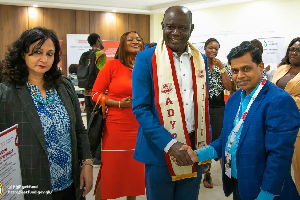“In a tradition extending from Freud and Weber to me,” says Prof Robert Hogan, the author of Personality and the Fate of Organizations, “people argue that leadership is a function of the characteristics of individuals. This means that some people have more talent for leadership than others.” Thus, writing in the Accra Daily Mail last Thursday, seeing it as superfluous to show his readers why, columnist Ato Kwamena stuck his head out to say “the NPP presidential primary remains a contest between Foreign Minister, Akufo-Addo, and Vice-President Aliu Mahama. The circumstances are just not right for the others, and my blunt truth to the others is that they are throwing money at a lost cause.” But after a categorical intro that the circumstances are right for both Aliu and Nana Addo, the writer retracts with obtrusive perplexity, “I admire Akufo-Addo a lot. He’s a serious man. A man who has his head screwed on straight. But deep down, you and I know that Akufo-Addo is not the man we want at the helm of the affairs of this country. He’s not the man to ‘heal’ this country – bring us together as one.” Well, according to the Stoic philosopher, Epictetus, the only thing we truly own are things that come from inside and are under our own control: opinion, pursuit, desire, aversion, these things are free, unbound and can never be taken away. So, go Ato! While calling Nana Addo “extremely competent,” Ato goes on to pontificate, “But at this time in our history, he’s not the right man for the job.” In his view, the Kufuor presidency “has taught us that confrontation is not the most effective way to govern a country. What has kept us together as a country, to a large extent is Kufuor’s ‘gyae man monka’ attitude.” Ato, the analyst, conveniently forgets that it was the uncompromising ‘confrontation’ of the leadership and rank and file of opposition forces that sent the National Democratic Congress packing cement and foreign accounts into opposition.
He describes Nana Akufo-Addo as “a no-nonsense man,” but with a twist of disparage. Under Akufo-Addo, “Rawlings’ perennial lies, slanders, and provocations would have been matched with an equal and proportional force. And this would not have been in the national interest. When two elephants fight, the grass suffers. But through Kufuor we know that the most effective way of dealing with a megalomaniac is to ignore the person.” His conclusion is simplistically disguised with some deleble gloss of intellectual stamp duty, “Akufo-Addo, in Kufuor’s position, would have been a tit-for-tat President. We don’t need that now.”
The truth is that there are so many Ato Kwamenas out there who still see Nana Addo as ‘patapaa’, aggressive, and belligerent, despite the fact that in the last five years Nana Akufo-Addo has won overwhelming praise, both at home and abroad, as an accomplished, consummate international diplomat. Indeed, it is rumoured that shortly before Rawlings handed over to Kufuor, the latter asked the former if he had any special request he would wish satisfied. Mr Rawlings is said to have responded: “Just don’t make that Akufo-Addo boy your Attorney-General.”
In his relatively short time as A-G, top government officials, former and present, were prosecuted. This, to his detractors confirms his belligerent nature. Ironically, he was also lambasted for going ahead to secretly negotiate with certain former government officials to quietly pay back monies allegedly stolen by them from state coffers but hard to secure a conviction on. This was apparently squarely criticised within his party or, as legend would have it, at Cabinet. Akufo-Addo was reluctant to leave the A-G’s. Qanawu, often the pundit on reshuffles, remembers going to Nana Addo one evening to say, “I’ve heard that you are to be moved to the Foreign Ministry.” He looked up with a saddened but straight face and said: “I wish he [Kufuor] makes me stay here [the A-G’s]. There’s so much to do in terms of legal reforms.” The point was that to him the priority was in institutional reforms and not to use the law for ‘tit-for-tat’ politics.
Ato, with the confidence of Saddam’s Information Minister, Comical Ali, invents a claim and, abusing his poetic licence, tags the presidential aspirant with it: “The main claim of Akufo-Addo to the presidency of Ghana is that he has sacrificed a lot for this country and for the NPP.” Theresa Tagoe, Amadu Kaleem, Kweku Baako and Harruna Attah have all sacrificed for country and NPP. Ato continues on Nana Akufo-Addo, “He feels he’s served Kufuor faithfully for over 6 years as Attorney-General, and then Foreign Minister, and coupled with his years of leadership in the NPP he’s the right man for Ghana. So to his supporters, he is the inevitable heir of the NPP leadership, after President Kufuor.”
If Ato had taken time off from his busy one-track agenda and revisited Nana Akufo-Addo’s five years as Foreign Minister in some detail, he most probably would have revised his notes; that is, if he wanted to.
There is something about Akufo-Addo’s leadership credentials that his detractors choose to ignore: his versatility. The multi-million Ghana Cedi question is this: how can a man that we are constantly told is arrogant and elitist at the same time draw the critical mass of his support from the grassroots – the so-called ordinary man and woman? Remarkable! Perhaps, as people we can be dubiously adept in interchanging self-confidence with arrogance, and selfless patriotism with elitism. From 1978, when he mobilised the nation to reject Gen Acheampong’s ‘Union Government’ concept, through his Supreme Court battles, transiting at Kume Preko junctions to political platform shredding of the NDC, Nana Akufo-Addo has carved an enviable national reputation for himself as a fighter. He is by no means alone in this, except he has chosen to aim for the very top in local politics.
The enduring image of him as spokesman for the Alliance for Change, looms large. It is as if he was the man who instructed the Association of CDRs to bring mayhem on what endured as a peaceful demonstration in Accra on May 9, 1995, even though the hired thugs saw to the death of Hongar, 14, Asante, 22, Opey, 25, and Aminga, 43. A press statement read by Nana Akufo-Addo on Friday, 12 May, 1995 spelt out the fighting spirit of the Ghanaian which he, Messrs Pratt, Baako, Newman, Wereko Brobbey, Adjiri Blankson and others represented: “We shall not relent, but shall continue to struggle until the noble aspirations of those who fell in the battle for improvements in the living standards of the people and the establishment of genuine democracy are achieved. Let those who are cocooned in the colonial slave castle, surrounded by guns and Mowags, know that Ghanaians will not give up, until change is won.”
Change was won and since then the other aside of his leadership prowess has been more than obvious but for those who just refuse to see. Leadership is in the army commander who has the versatility of mind, the prophecy of sight and the pragmatism of action to devise and customise his strategy of offence to counter any given enemy and war situation. The P/NDC regime could not be fought and defeated with a “gyae man won ye” [leave them to be] attitude of pacifism. Effective leaders, Ato, must possess a number of seemingly contradictory qualities and skill sets. They are the dedicated disciples of the Yin and Yang principles and dimensions. Leadership development experts Bob Kaplan and Rob Kaiser, who are also the authors of Versatile Leader, have demonstrated a reliable connection between leader versatility and corporate or institutional effectiveness – and an equally strong connection between a lack of versatility and stalled or derailed policies or careers. Current thinking on leadership generally acknowledges the need for qualities and skills that are seemingly in opposition – and, Ato, this is what Nana Addo Dankwa Akufo-Addo has demonstrated from street marches to chairing crucial UN Security Council meetings all throughout his political career. He is by no means not alone in this – but, at least grant him that.
Sometimes leadership calls for forcefulness, sometimes for tactful negotiations. Nana Addo and many like him kept the pressure on the NDC to defeat their will power, an annihilation strategy which in war is called ‘Enveloping the Enemy.’ Has the NPP forgotten so soon how the constant pressures from its leadership, through the courts, in the constituencies, in Parliament, in the mass media and on the streets, forced the NDC to concede in improving the integrity of the electoral system? In war you maintain the pressure and advance to give your opponent a reason to conclude negotiations. It is not for nothing that Diplomacy, that popular chess-like game developed by Alan Calhamer in 1954 is all about how best you can conquer, whether through aggression or by stooping. Diplomacy differs from most war games in several ways. The result of a move depends on the support or opposition of the units in neighbouring spaces, making social interaction and interpersonal skills, the formation and violation of alliances crucial parts of the game plan. The game can't be won by going it alone, except in a last mad dash of aggression from a strong position. In the mean time one makes compromises and promises to one's allies while spreading fear and confusion among one's enemies.
Discerning Ghanaians should not allow the exceptional assets of leadership, like versatility, to be seen as liabilities. Should those who are blessed with remarkable energy, fortitude, and boundless faith in their own prowess be embarrassed by such gifts? If, it cannot be doubted that those who fought against the Rawlings regime and others before it fought for something noble, then we should not use such gallantry to deny the nation of the benefits of leadership versatility. A fighting spirit founded on the bedrock of democratic principles is what Nana Akufo-Addo possesses – and you doubt that at your own embarrassment. The same force that was behind the heroic taming of the P/NDC in the 1990s is the same force that can push this nation to unleash its potential to the fullest. The challenge for the versatile leader, they say, is to hold contradictory directions in the mind at the same time and still retain the ability to function at a high level. The versatile leader is the kind who is skilled at forcefulness and yet will equally welcome the useful skill of enabling others to lead themselves in productive ways. He knows, as recommended by Sun Tzu’s Shih, to keep himself in a position of force and when to compromise but even then from a position where the enemy is fully aware of his reserve might.
Without versatility at the top, indecision may reign as rigidity and imbalance become the driving force of policies and personnel. This can serve as the most common impediment to developing effective leadership and, ultimately, developing a nation. Kaplan and Kaiser, consultants with Kaplan DeVries Inc of Greensboro, North Carolina, view versatility, the absence of imbalance, as the key to high performance levels. Versatile leaders are able to continually adjust their behaviour, deftly applying the right approach or blend of approaches to the right degree for the circumstances at hand.
So what is it about Akufo-Addo that after his deft diplomacy in helping to negotiate peace in Liberia and la Cote d’Ivoire, in finding a common ground between Mbeki and Gadhafi, he can still be seen as a war-monger? It is worth recalling that in the very week that Akufo-Addo and others led the Kume Preko demonstration that cut him out in contemporary Ghanaian politics as an uncompromising fighter, The Statesman of weekending May 21, 1995, reported that, “Speaking at the La Dade Kotopon Ward meeting of the New Patriotic Party at Quartey’s Villa… Nana Akufo-Addo deplored the current situation where the indigenous businessman has been completely marginalised, while foreigners systematically take control of the commanding heights of the economy…” The paper also quoted him calling for massive participation in the voter registration exercise, “to ensure that we use our brains, and not guns, to get out of a situation we don’t like and not set our country to a Liberia or an Algeria.” The import of the above reference is two-fold: that he is a stickler of tried and tested principles, articulated in his concept of Indigenous Capitalism; that his fighting spirit is principled on the achievement of a peaceful, prosperous environment of liberal democracy in which the masses of our people will be the major beneficiaries. Not many Britons (or even European leaders) liked Margaret Thatcher but they admired her strength in conviction. She had the quirk to define her fight and her opponent and fought relentlessly and often successfully for what she felt was right, regardless of the force of opposition against her. The same energy she used to fight the Falklands War was brought to bear in her relentless offensive in reducing the size of the working class and bringing more Britons into the middle classes. You may love her or hate her, but the lady had a handbag and she was not afraid to use it when she had to! Qanawu would recommend Robert Greene’s The 33 Strategies of War to the Kwamena Atos of this world. One reviewer has called the book "an indispensable book, [which] provides all the psychological ammunition you need to overcome patterns of failure and forever gain the upper hand."
Some of the keys to warfare is to drop preconceived notions, re-examine beliefs and principles, keep inventing new plans, adapt to current times and reverse course doing the opposite of what has been done before if that is what the situation demands, without losing track of the underlining principles and main goal. There are times for hyper-aggressive tactic. If Lord Nelson had listened to his superior Sir Hyde Parker in 1801 and not used his own confidence and leadership he would not have defeated the Danish Navy for Britain.
In his classic, Seizing Destiny, Richard Kluger gives a historical detail of how three of the most brilliant Founding Fathers of America — Benjamin Franklin, John Jay, and John Adams — with knowledge of the military readiness of the republican army in the background, outfoxed British, French, and Spanish diplomats to win more than ample boundaries for their new republic. Finesse, however, had little to do with General Andrew Jackson’s Indian-slaughtering and disdain for the Spanish garrison in capturing Florida, we are told. Or with Secretary of State John Quincy Adams’s bluff and bluster in gaining for the nation a northwest passage to the Pacific. Yet, it never stopped any of the last two pioneers from meriting the presidency of a nation that was to later become arguably the ‘greatest’ on earth. Surely, it is way past time to see Nana Akufo-Addo’s versatility as a leadership asset to take this tortured nation to this next level after Kufuor.
















